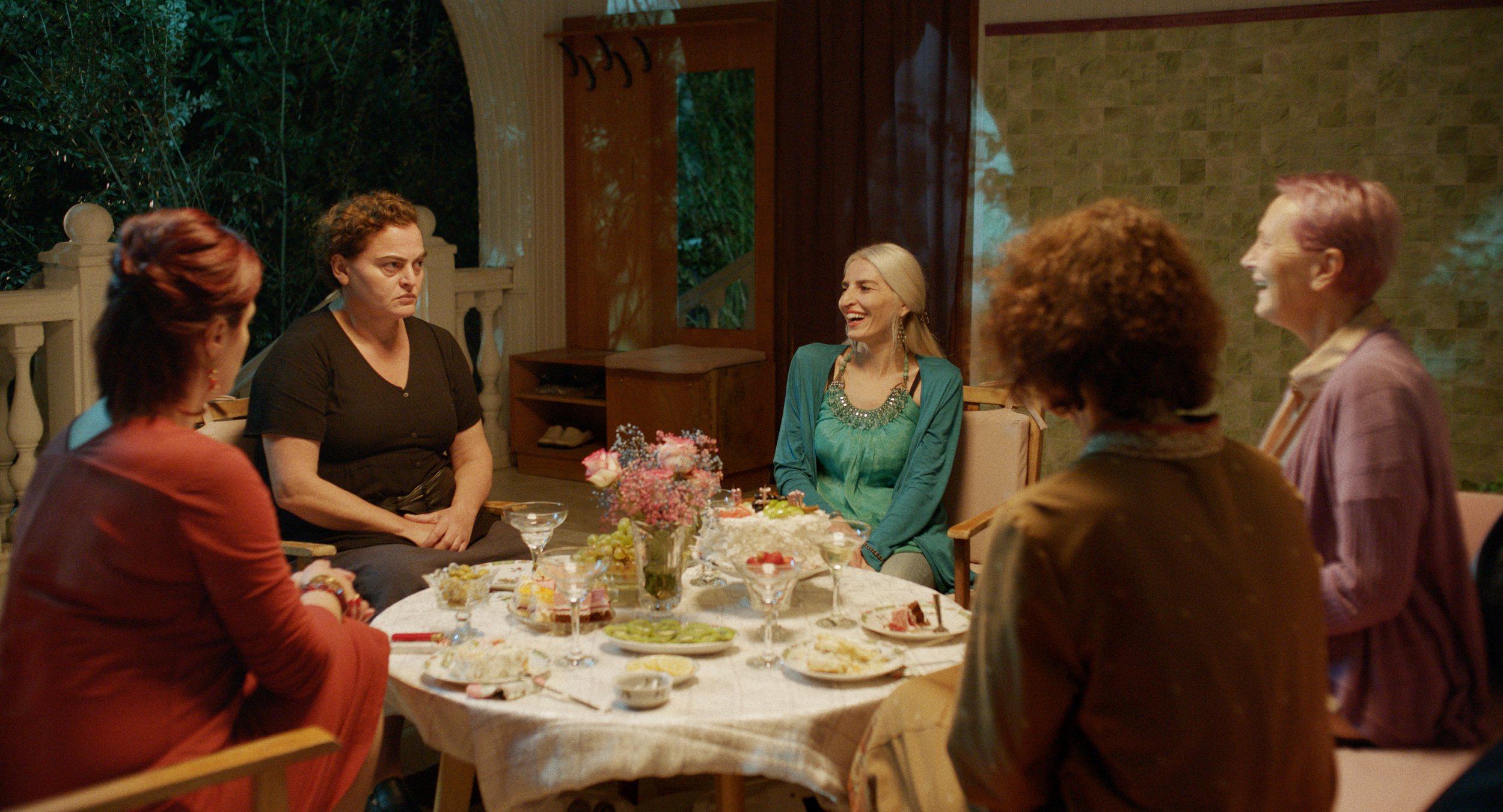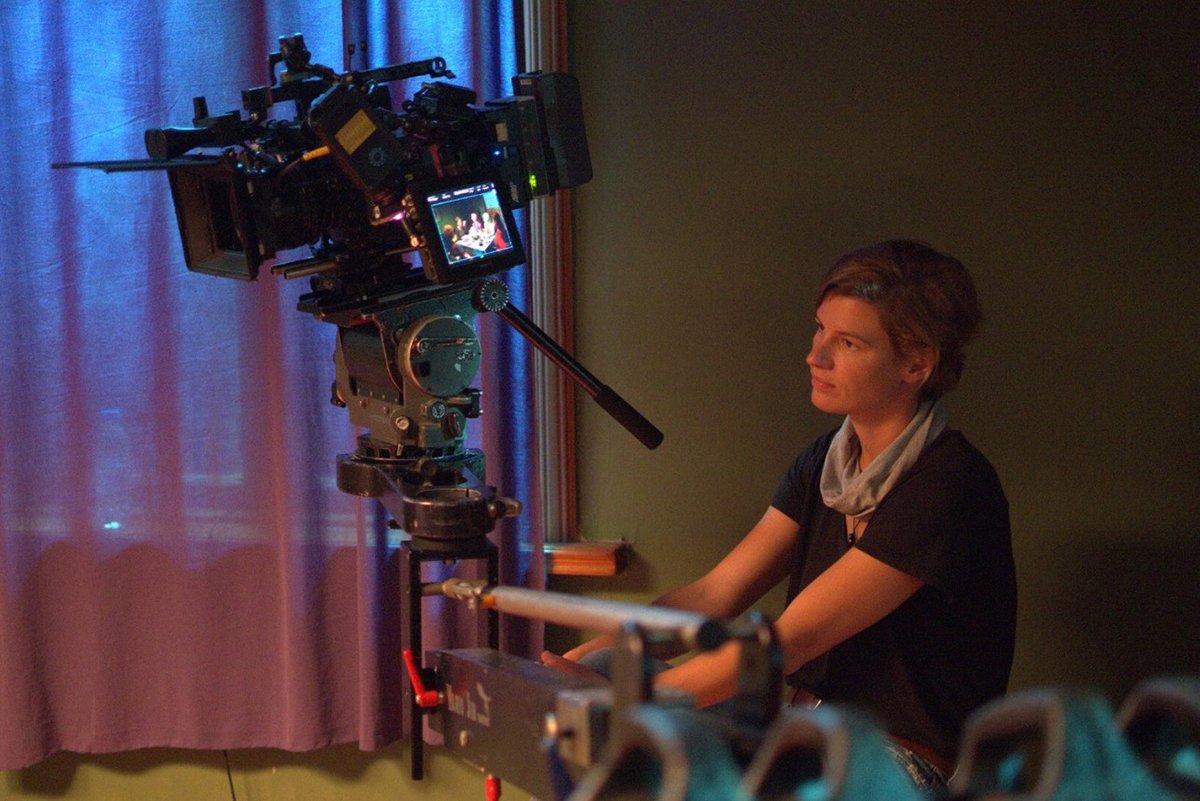Reading between the lines and light
Dual ZSIFF awardee, cinematographer Agnesh Pakozdi, on visually constructing the quiet defiance of Blackbird Blackbird Blackberry
Agnesh Pakozdi on the set of Blackbird Blackbird Blackberry. Photo: Juda-Khatia Psuturi
At this year’s Zsigmond Vilmos International Film Festival, one film that seemed to quietly captivate both audiences and jury alike was Blackbird Blackbird Blackberry. Directed by Georgian filmmaker Elene Naveriani and shot with a haunting elegance by cinematographer Agnesh Pakozdi, the film, among many things, stood out for its painterly frames radiating an emotional restraint that’s becoming increasingly rare in how stories are being told these days. As the festival unfolded in Szeged’s century-old heritage movie theatre, Belvárosi Mozi, we managed to steal a few moments with the cinematographer who was attending this festival for the first time, and made her presence felt in more ways than one. Aside from winning two awards for the film – the Critics’ Choice Award and the Vantage Vision & Special Grip Hungary Award – she was also an important voice in several panel discussions at the festival, sharing insights on topics like coming-of-age stories in cinema, the female perspective, and more.
Discussion at ZSIFF 2025. Photo: Szilvia Molnar / Szegedify
Fittingly enough, Blackbird Blackbird Blackberry explores just these very themes – an often-overlooked terrain of a late-blooming journey of self-discovery told through the eyes of a middle-aged woman. Etero has been single all her life, but her solitude doesn’t reek of loneliness and longing; instead, it pulsates with an unflinching confidence and an innate sense of autonomy. The film handles sex and sexuality with the same unapologetic clarity that defines its protagonist – something that Pakozdi’s lens accomplishes, walking the tightrope between intimacy and space. She describes the story, which is based on Georgian author Tamta Melashvili’s highly praised book, “a bit of a fairytale”. Set in a remote village in Georgia, the plot unfolds when Etero, while picking blackberries at a ravine one fine morning, almost plunges to her death when she loses her footing. The incident acts as a jolt, flinging open the proverbial floodgates, and what follows is quite a radical transformation where Etero begins to take complete charge of her life, stepping into the role of the main character in her own story for the first time.
“The accident acts as a catalyst to push her to act, so it was very important to show her as the initiator. If she wants the man, for instance, it is she who is taking charge – there is not even a moment of seduction or playfulness. We see a libido that’s understated, yet unstoppable, and it was such a pleasure to film a story like this. These are strong feelings, and we hardly ever see characters like her embody emotions like these,” says Pakozdi, lauding actress Eka Chavleishvili’s impeccable Etero. “We wanted her to be a physical being, but it was crucial not to push the camera in her face. The idea was to create a portrait – where we show her body, her lust, her sensuality, the way she treats herself, her guilty pleasures, etc. – but without getting too intimate. So, from a cinematographer’s point of view, it was important not to go too close. And Eka is a fantastic actress. In the way she walks, moves, and arches her shoulders, she just shapes the character. It’s all about what she does, and how my camera reacts to it – she’s an endless source. Also, Elene’s sharp instincts guide everything – she knows exactly what she wants. It was great to see how, between the two of them, the character gains muscle, and my task was to observe and tap into the essence of it,” she says.
Something that stands out in the film throughout is Etero’s gaze that speaks volumes even before she utters a word. It’s defiant, almost confrontational – yet it’s not anger as much as the impact of someone living by her own rules, and Pakozdi’s camera amply lingers on this gaze. “The way her eyes speak is a gift – it’s so powerful that I never needed a super closeup. Between her eyes and her body language, the story is told,” she says. While much of the film rests on Etero reclaiming her sexual agency, it was also important for the creators not to objectify the man. “The chemistry between them had to be strong. If we believed in their attraction for each other, it would justify the beauty of the physicality at play,” says Pakozdi. The scenes were heavily rehearsed, not to romanticize the encounters, but to make room for precision, mutual comfort, and an emotional neutrality of sorts. The frames deftly capture an honest intimacy without getting sentimental, mirroring Etero’s own balance of feeling deeply but also drawing boundaries.






Film stills from Blackbird Blackbird Blackberry. Copyright ALVA FILM & TAKES FILM
The atmosphere of rural Georgia, filmed in the Imereti region of the country, is something that breathes through the film and feels almost tactile. The interiors wrapped in light and shadow, in hues of violent and dark green, or a weathered red, call to mind the paintings of Edward Hopper, who, as it turns out, was indeed a reference. Pakozdi says, “Elene and I have worked together for a very long time now, and we do have a set of references – painters and filmmakers – we go back to, whose work we like a lot. Each film, of course, has a different style and mood, but certain inspirations tend to pop up time and again, and Hopper is one of them.” She continues, “The colour palette in this film came from the colours we found in the homes of this region. Georgia is a very small country but hugely diverse in character, and these very unique colour combinations may have somewhat coincided with Hopper’s paintings.”
This is Pakozdi and Naveriani’s sixth film together and perhaps the most lauded one. Having premiered at Cannes Directors’ Fortnight in 2023, the film still continues to lap up praise two years on. “The age group above 50, both women and men, are so touched when they see a story like this, they feel seen,” says Pakozdi, adding, “But recently, I got a chance to show the film to a class of film students during a lecture – the gen Z so to speak, between ages 18 and 20 – and I was surprised to see how positively they responded to it. Aside from finding it slow – which is understandable, I guess – their feedback was really good.”
Hungarian-born Pakozdi, who is now based in Berlin, has worked extensively on international projects throughout her film career, and language, she says, has never been a barrier for her. “I know the script word by word, in English in most cases – but sometimes I feel shooting in a language that I don’t understand enables me to read and capture every form of non-verbal acting, without getting distracted by things like diction, intonation, etc. I love being in this state; it sharpens my attention in a very specific way,” says the cinematographer whose repertoire includes films in Chinese and Greek as well.
Her dual awards at ZSIFF are her first as cinematographer for Blackbird Blackbird Blackberry, but next year she’ll take a seat on the other side of the table, returning as a jury member. “I enjoyed my time at ZSIFF this year, saw some great films and not so great ones. I also had some good conversations with both panelists and audiences. Small festivals give you that space, and I really like that. Also, it was my first time in Szeged – it’s such a great city, a perfect backdrop for a festival like this; you’re never too far from where it’s all happening.”
Awardees Agnesh Pakozdi, Ádám Miklós, and Gavin Wynn at the ZSIFF 2025 Award Ceremony. Photo: Szilvia Molnar / Szegedify
Blackbird Blackbird Blackberry can be streamed on HBO Max.


